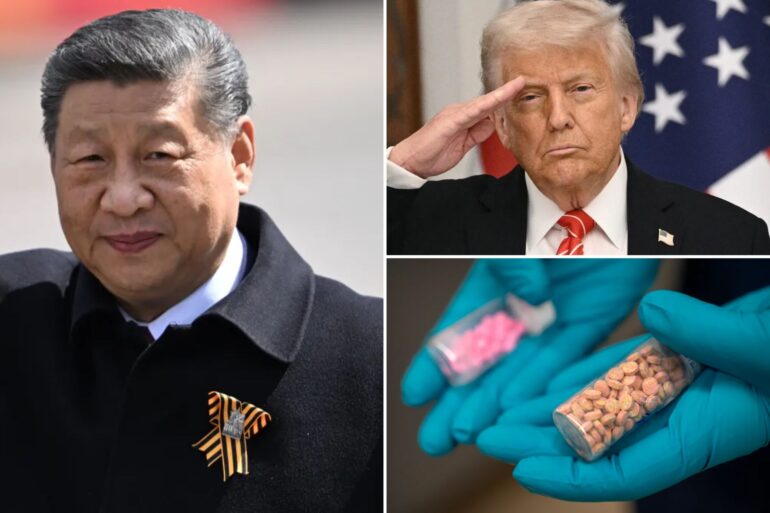🔴 Website 👉 https://u-s-news.com/
Telegram 👉 https://t.me/usnewscom_channel
The opening round of the tariff war with China is over. And earlier this week, President Trump achieved a very clear win.
The president had Chinese leader Xi Jinping on the ropes. Trump’s 145% tariffs on Chinese goods landed a crushing blow to Beijing’s economy, already staggering under the weight of rising unemployment, unsustainable debt, and rising bankruptcies.
But instead of giving China a knockout punch, Trump decided to hit the pause button. And it’s worth asking why.
With foreign investment pouring into the US, job growth strong and inflation low and falling, Trump was under little domestic pressure to back off of Beijing, skittish global markets notwithstanding.
Xi Jinping, however, was desperate to make a deal.
The past few weeks have seen tens of thousands of Chinese businesses closed and millions of workers laid off.
Had the high tariffs continued, over 50% of export companies would have gone under, and 30 million workers would have been on the streets.
Xi knew that, with falling property values and shrinking domestic consumption, keeping exports flowing to the US was vital to China’s survival.
Americans only buy about 16% of the total exports, but because we buy in bulk and pay on time, we provide 50% of that sector’s profits.
All this is why China, as soon as the tariffs were announced, called for a meeting. Not long after, China’s finance minister, Lan Fo’an, traveled to Washington, DC to meet with Treasury Secretary Scott Bessent. The meeting was held in the basement of the International Monetary Fund and, at China’s insistence, was kept secret.
This meeting paved the way for last week’s confab in Switzerland, at which China made some major concessions, reducing its tariff rate on US goods to 10% and, even more important, promising to stop the flow of deadly fentanyl into the US.
In response, the US has decided to temporarily release its chokehold on China’s economy. The tariff on China’s goods will drop to 30%, enough to generate billions in revenue for the US, while giving a little breathing room to that country’s exporters.
Trump has learned three things from the current slugfest with Xi Jinping.
First, he has been reminded that China always cheats.
China’s negotiators in Switzerland admitted that they did not honor their original trade agreement with Trump, signed in January 2020, because Biden was weak.
Follow the latest on President Trump’s tariffs
“The Chinese delegation basically told us that once President Biden came into office, they just ignored their obligations,” Bessent reported. “We had an excellent trade agreement with China, and the Biden administration chose not to enforce it.”
Trump’s tariffs forced Xi Jinping’s negotiators into a second big reveal when, for the first time, they linked fentanyl to the tariff wars. They would stop the outflow of the deadly drug and its chemical precursors from China, they indicated, in return for tariff relief.
This is an astonishing admission on Beijing’s part, and one that should anger every American, given that the death toll from fentanyl overdoses is approaching half a million.
For years on end, the Chinese authorities, who oversee a high-tech surveillance state without parallel in the history of the world, have falsely claimed that they simply had no idea where in China the drug was being produced. Instead, they deflected blame onto the US, saying that fentanyl was solely America’s problem.
Now, by linking fentanyl to tariffs, they have confirmed what many already suspected: China could have shut down the fentanyl trade with the Mexican cartels at any time.
Fear of renewed tariff hikes may finally force China’s cooperation, not just in stopping the fentanyl trade, but in ending the laundering of dirty cartel money through China’s banks, and perhaps even in revealing the location of the labs themselves. Trump should demand no less.
The final lesson learned from Trump’s tariff strategy is that mighty China, the Communist giant supposedly poised to dominate the world of the 21st century, is a paper tiger.
In the end, Trump decided not to use America’s vast leverage to push China into collapse, with all of the unpredictable consequences that might ensue for the Chinese people and the world. But now he knows he could.
And, equally importantly, the Chinese leadership knows this too. They also know that, this time around, Trump is starting early — still has plenty of time to act if they renege on the deal.
Steven W. Mosher is the president of the Population Research Institute and the author of “The Devil and Communist China.”

